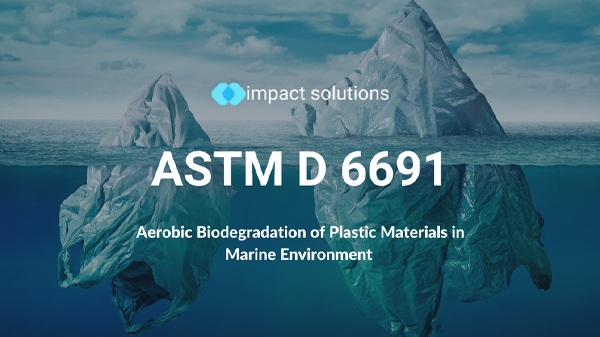What is the ASTM D 6691?
The ASTM D6691:2017 is a test method carried out under controlled laboratory conditions. It aims to characterise polymer materials that have the potential to be biodegradable in a marine environment. Determining the biodegradability of a polymer is paramount for the evaluation of the ecological behaviour of materials. Biodegradability is a key parameter, as it ensures the degradable substance will not cause long-term risk in the environment.
We currently live in a world where plastic waste is a problem, particularly with ships at sea. As plastics are becoming more prevalent on ships, their end-of-life disposal must be considered, as the chances of plastics being disposed of at sea will always exist. Therefore, we must consider the biodegradation mechanisms within a marine environment.
The ASTM D6691:2017 standard applies to any polymer material containing a minimum of 20% carbon content that is not inhibitory to the microorganisms already present in the marine environment.
How to test for biodegradability of plastics in marine environments?
A test sample will be assessed for the characterisation of carbon content and molecular weight before testing. Firstly, it is crucial to prepare the marine environment for the test by ensuring that it has the correct microorganisms present. Secondly, the polymer sample will be submerged in the inoculum (marine solution) in a Biochemical Oxygen Demand (BOD) system.
The BOD system comprises test bottles and CO2 sensors and together creates a closed system. The microorganism in the marine solution will slowly consume the polymer sample and simultaneously develop carbon dioxide. As a result, it generates a pressure drop in the BOD system. The measuring principle of the BOD is to detect such pressure drops. The BOD sensor will display the BOD value in mg/l O2.
According to the ASTM D6691, the biodegradability of the sample material is determined by the released CO2 (biogas) measured through the use of a respirometer. The biogas is the conversion of our polymer to CO2, as noted in the percentage of conversion. The measured biogas produced is used to determine biodegradability, by comparison to a known reference.
A typical respirometer type system can run between 10-90 days. Nevertheless, if the specimens are extremely biodegradable, it is acceptable to terminate the experiment when the cumulative CO2 production plateaus. At the same time, the experiments can extend if no biodegradation has occurred in a specific timeframe.
Impact Solutions are set up to carry a series of Biodegradability tests offering full material analysis services: Chemical, Environmental, Elemental based on BS EN 13432 directions as well as we can accommodate all types of Lab-scale biodegradability tests both aerobic and anaerobic.
If you have a product and you want to understand its biodegradable potentials, you can contact our experts at impact solutions.

